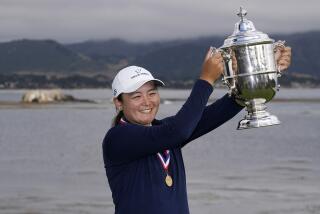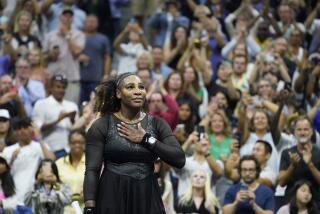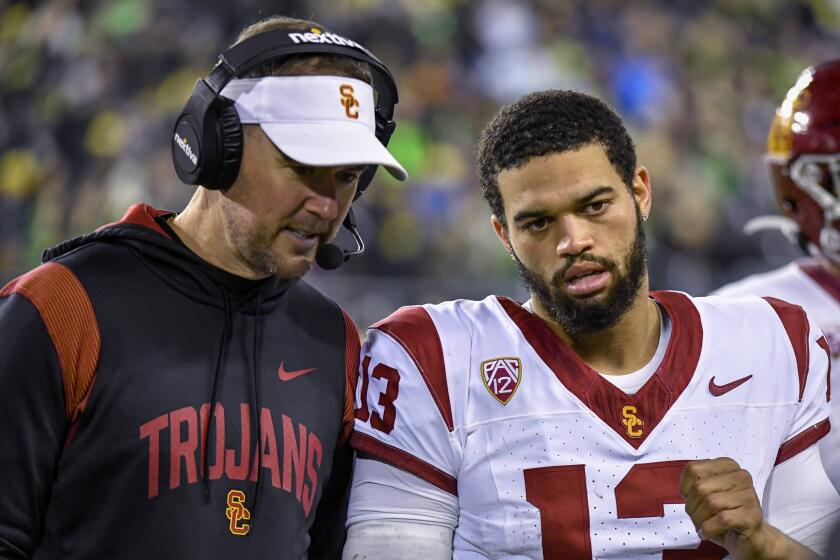Capriati’s Comeback Is a Winner
ESSEN, Germany — The second time around, Jennifer Capriati got it right.
Eight days after the troubled women’s tennis star abruptly aborted a comeback at the Paris Open, Capriati successfully went through with it here on the first day of the Faber Grand Prix and defeated Kristie Boogert of the Netherlands, 6-1, 6-2.
“I’m not sure it was all that easy,” said Capriati, who, nevertheless, did make it look easy and who smiled radiantly after her first victory in 30 months.
She was surrounded by television crews and security guards at Essen’s Grugahalle fairgrounds and the German audience seemed supportive, murmuring schade or “too bad” when she missed.
“I was quite nervous because it’s been a long time since I’ve been out playing in front of a lot of people,” said Capriati, conservatively turned out except for some vamp fingernail polish. “But I just thought, ‘Play like you’ve been playing [in practice sessions],’ and there it is. I started getting comfortable out there.”
Capriati, 19, who has been living in Wesley Chapel, Fla., and training at the Saddlebrook tennis resort, looked fit and strong Wednesday.
Boogert, 22, who could be heard puffing as the seemingly tireless Capriati ran her around the court, said afterward that she could easily imagine the unranked Capriati resuming her former position in women’s tennis top 10.
“I played against a few top-10 players last year and she made me run the hardest,” said Boogert, ranked 32nd. “At times, her forehand was as hard as Steffi [Graf’s]. It was serious hard.”
Boogert added, however, that she thought Capriati’s advantage Wednesday lay in strength and speed, rather than precision and strategy.
“At times, I had the feeling she had no clue where she was hitting,” the Dutch woman said. “She was just hitting hard.”
Boogert admitted that, like Capriati, she too had been nervous before the comeback match, because she didn’t know what she would be up against.
“I just had no clue what to expect,” she said, adding that she spent the first three games of the first set watching Capriati’s style, rather than concentrating on what she was doing herself. By the time she had decided that her best strategy was to hit to Capriati’s relatively predictable backhand, she said, it was too late.
“It went too quick in the beginning, and then I was just running behind every ball,” Boogert said.
Capriati, who started on the tour at 13 and was an Olympic gold medalist at 16 in 1992, was defeated in the first round of the 1993 U.S. Open and seemed unable to recover her psychological bearings.
She dropped off the tennis circuit and went for a well-publicized walk on the wild side that included a brush with drugs, a shoplifting citation, two stays at substance-abuse facilities and the humiliating transmission of her police mug shot--complete with nose-ring--around the world.
She was even quoted as saying she had considered suicide during that unhappy period.
But Capriati seemed to be on the outs with her life as a tennis celebrity more than with the game itself. She quietly returned to serious training in the summer of 1994, setting off rumors that she would make a comeback, but swearing she wouldn’t compete until she was ready.
She tried to come back for the first time in November of 1994 at a tournament in Philadelphia, attracting considerable curiosity--particularly when she showed up minus the nose-ring, but with her hair dyed purple and orange. But she lost in the first round, and dropped off the tour once again.
Capriati, wary around journalists, made no attempt Wednesday to explain her lost months, and tournament organizers warned that if anyone asked about her personal life, they would immediately cut off all media access.
With reporters sticking to innocuous questions about tennis, Capriati seemed relaxed and happy, talking about how good it felt finally to win again.
“It meant a world to me,” she beamed, looking like an entirely different person from the nervous, unhappy young woman who had announced less than two hours before she was scheduled to play at the Paris Open that she wouldn’t participate. She said then that she had a muscle pull, but there was speculation that Capriati had, in fact, lost her will to play again.
“It was almost like old times,” she continued. “It was fun. I felt that I’ve been ready. I’ve been happy with the way I’m playing, otherwise I wouldn’t be here.”
The big smile faded somewhat when Capriati was asked about her plans.
“I haven’t set any goals,” she said. “I’m just going to take it one thing at a time, just play this tournament. The first match is over and done with, that’s the hardest part.”
Capriati’s father, Stefano, watched from a court-side seat, standing to applaud his daughter when she won. He has been sharply criticized for pushing her too hard, at too young an age, and contributing to her emotional collapse.
Asked whether she felt his support Wednesday, Capriati answered enthusiastically, “Oh yeah. I was so happy to have him there.”
Capriati is scheduled to play Austria’s Barbara Schett today.
More to Read
Go beyond the scoreboard
Get the latest on L.A.'s teams in the daily Sports Report newsletter.
You may occasionally receive promotional content from the Los Angeles Times.










